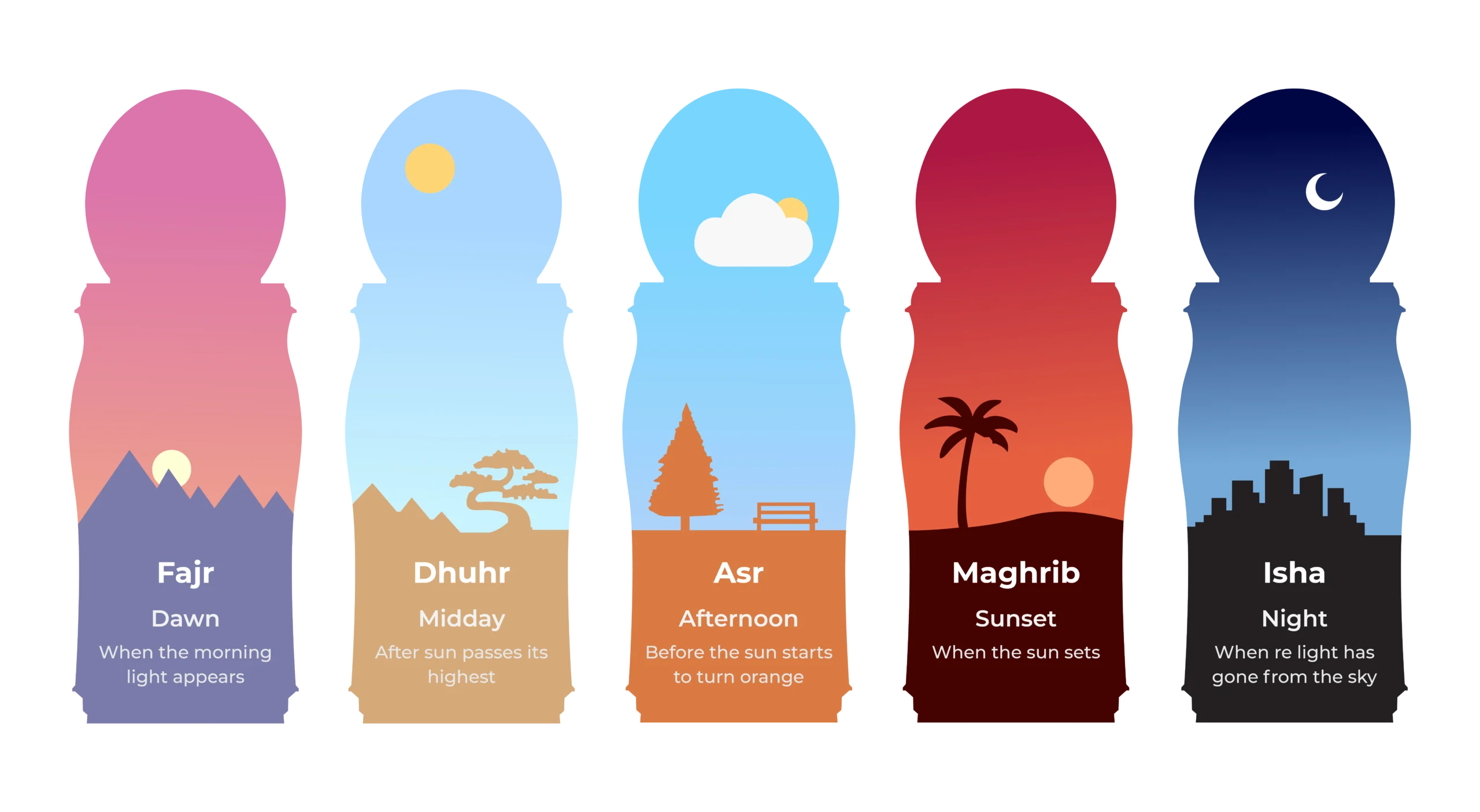Learn About Islam

Origins in Mecca
Islam originated in the 7th century CE in Mecca, within the Arabian Peninsula, where the Prophet Muhammad (SAW) received divine revelations.

Final Revelation
Islam completes the same faith taught by earlier prophets, with Muhammad (peace be upon him) as the final messenger.

Global Reach
Islam is the second-largest religion, with over two billion followers worldwide, forming majorities in many regions and thriving as minority communities elsewhere.

Community Diversity
The global Muslim population spans various cultures and ethnicities. While interpretations differ, core beliefs and practices unite Muslims worldwide.

Abrahamic Faith
Islam: Monotheistic Abrahamic tradition, prophets' legacy.

Quran as Revelation
Allah’s word & scripture to the Prophet via Angel Gabriel.

Meaning of Islam
Islam: Submission to God's will, obedience, devotion.

Definition of a Muslim
Muslim: One who submits to God, follows Islam's teachings.

Allah
The Arabic word for God, worshiped by Muslims as the one true God, eternal, and without equal.

Quran
The holy book of Islam, believed by Muslims to be God’s direct, eternal word revealed to Prophet Muhammad.

Muhammad (SAW)
Final prophet in Islam, through whom the Quran was revealed, and whose life is a model for Muslims.

Muslim
A person who follows Islam, submitting to Allah’s will through worship, moral conduct, and belief in divine guidance.

Sunnah
The teachings, sayings, and actions of Prophet Muhammad, serving as an essential guide for Muslims alongside the Quran.

Ummah
The united global community of all Muslims, bonded by faith, shared beliefs, and collective responsibility in practicing Islam.
Islamic Beliefs (Articles of Faith)
1. Belief in One God (Allah)

Uniqueness (in Islamic Perspective)
According to Islamic teachings, Allah is understood to be absolutely unique and eternal, having no beginning or end, and nothing in creation is considered to resemble Him.

Attributes (as Understood in Islam)
The Quran describes Allah using beautiful names and attributes, such as Ar-Rahman, meaning the Most Compassionate and Merciful.

Rejection of Polytheism (in Islamic Tradition)
Islamic doctrine rejects associating partners with Allah, emphasizing monotheism as a foundational principle in its teachings and practices of worship.
2. Belief in the Angels

Messengers (in Islamic Tradition)
In Islamic teachings, angels such as Gabriel are described as conveying Allah’s messages, including the revelation of the Quran to Prophet Muhammad ﷺ.

Recorders (according to Islamic Teachings)
Islamic doctrine holds that two angels are assigned to record each person's deeds—both good and bad—for judgment in the Hereafter.

Guardians (in Islamic Theology)
Within Islamic theology, angels are said to be assigned by Allah to guard and protect individuals through His divine command and wisdom.
3. Belief in Prophets and Messengers

Guidance Through Prophets
In Islamic teachings, Allah is described as absolutely unique and eternal, with no beginning or end. Nothing in creation is said to resemble Him.

Finality of Prophethood
The Quran describes Allah with beautiful names and attributes, including Ar-Rahman (the Most Compassionate) and Ar-Rahim (the Most Merciful), reflecting His infinite kindness and mercy.

Respect for All Prophets
Islamic tradition holds that all prophets are honored equally, and their original messages emphasized monotheism and righteous living.

Universal Message
According to Islamic teachings, prophets were sent to every nation with messages suited to their time, guiding people toward the worship of Allah.
4. Belief in the Holy Scriptures

Torah (Tawrat)
According to Islamic tradition, the Torah was revealed to Prophet Musa (Moses) and contained laws and guidance for the Children of Israel. It is held that the original message was later altered by human hands.

Psalms (Zabur)
The Psalms are described in Islam as being revealed to Prophet Dawud (David), considered a book of praises and wisdom, intended specifically for his time and people.

Gospel (Injeel)
Islamic teachings hold that the Gospel was revealed to Prophet Isa (Jesus), promoting love and mercy. However, the original message is said to have been altered or lost over time.

Quran
The Quran, revealed to Prophet Muhammad ﷺ, is regarded in Islam as the final, complete, and unchanged word of Allah, intended to guide all of humanity in every aspect of life.
5. Belief in the Day of Judgment

Heaven (Jannah)
In Islamic teachings, Heaven is described as the eternal abode of peace and happiness for those who lived righteous lives and had faith in God.

Hell (Jahannam)
Islamic doctrine refers to Hell as the eternal place of punishment for those who rejected divine guidance and committed evil deeds.

Accountability
Islamic belief holds that each individual will be judged based on their faith and actions in this life.
6. Belief in Divine Decree

Allah’s Knowledge and Power
In Islamic understanding, Allah is described as knowing everything and controlling all that occurs in the universe through His will.

Human Free Will in Islam
Islamic teachings emphasize that people have the ability to choose their actions freely, even though Allah is understood to already know what they will do.

Balance of Fate and Responsibility
The concept of Qadar in Islam presents a balance between Allah’s control and human responsibility for their choices and actions.
Islamic Practices (Pillars of Islam)
1. The Declaration of Faith (Shahada)
The Shahada is the first and most important pillar of Islam, according to Muslims. It is their declaration of faith and the core belief of every Muslim:
“There is no god but Allah, and Muhammad is His messenger.”
This simple yet profound statement, Muslims believe, encapsulates the essence of Islam: the absolute oneness of God and the acceptance of Muhammad (peace be upon him) as His final prophet. Reciting the Shahada with sincerity is considered by Muslims to be the entry point into Islam. It serves as a constant reminder of a Muslim’s commitment to monotheism and the guidance brought by the Prophet. The Shahada unites Muslims around the world, transcending language, culture, and nationality.
2. Prayer (Salah)
Muslims are obligated to perform five daily prayers at specific times

3. Charity (Zakat)
Zakat is an obligatory act of charity for Muslims. It is a fixed proportion of a Muslim’s wealth (typically 2.5% of surplus wealth held for a year) that is given to the poor and needy. Muslims understand Zakat not simply as an act of generosity but as a recognition that all wealth belongs to God and is held in trust by individuals. They believe it serves to purify wealth, promote social justice, and support the less fortunate members of the community.
4. Fasting (Sawm)
Ramadan is the ninth month of the Islamic lunar calendar, during which adult Muslims who are able are required to abstain from food, drink, and sexual activity from dawn until sunset. Muslims view fasting during Ramadan as an act of worship, self-discipline, empathy for the hungry and poor, and spiritual reflection. It culminates in the festive celebration of Eid al-Fitr.
5. Pilgrimage (Hajj) to Mecca
Hajj is a pilgrimage to Mecca, in Saudi Arabia, that every physically and financially able Muslim is obligated to perform once in their lifetime. It involves a series of rituals performed in and around Mecca, commemorating the acts of the Prophet Abraham and his family. Muslims see the Hajj as a powerful demonstration of the unity and global community of Muslims.
These five pillars are what Muslims consider to be the foundational practices of their faith, providing a framework for worship, ethical conduct, and community building. They are essential expressions of a Muslim’s faith and submission to God.
Islamic Ethics and Morals
Islam, according to its adherents, places a strong emphasis on ethics and morality, providing a comprehensive framework for righteous conduct in all aspects of life.
1. Core Ethical Principles
Justice ('Adl)
Justice is presented in Islam as a core value, emphasizing fairness and the protection of rights in all areas of life—for both Muslims and non-Muslims.
Kindness and Compassion (Ihsan)
Islamic teachings encourage kindness, compassion, and mercy toward everyone—including family, neighbors, the poor, animals, and even enemies.
Honesty and Truthfulness (Sidq)
Integrity and truthfulness in speech and action are highly emphasized in Islam. Lying, cheating, and deception are strictly forbidden.
Trustworthiness (Amanah)
Islamic principles call for reliability and fulfilling trusts and obligations. This includes keeping promises and safeguarding what has been entrusted.
Patience (Sabr)
Perseverance and patience during challenges and hardships are considered important virtues in Islamic teachings.
Humility (Tawadu')
Islam encourages humility and discourages arrogance and pride. Recognizing God’s greatness is seen as a foundation for fostering humility.
1. Moral Guidelines in Daily Life
Family Life
Islamic teachings emphasize strong family bonds, respect for parents, kindness to spouses and children, and care for relatives.
Social Interactions
Promoting good neighborly conduct, assisting those in need, and contributing positively to the community are values encouraged in Islam.
Economic Dealings
Islamic guidance encourages fair trade, honest business practices, and prohibits interest-based transactions (usury or riba).
Environmental Stewardship
The earth and its resources are regarded as a trust from God, with an emphasis on responsible use and conservation.
Dietary Laws
Islamic dietary guidelines call for the consumption of halal (lawful) food and the avoidance of haram (unlawful) items such as pork and alcohol.
Modesty and Dress
Modesty in clothing and behavior is encouraged for both men and women, with the aim of upholding dignity and reducing temptation.
The Quran - The Holy Scripture of Islam
What Muslims Understand About the Quran:
The Quran is not just a book of scripture; it is the ultimate guide for humanity, containing divine wisdom, moral guidance, legal principles, and stories of past prophets and nations. It is revered as the final and complete revelation from God, superseding previous scriptures.
Muslim Understanding of Its Revelation and Preservation:
The Quran was revealed to Prophet Muhammad (peace be upon him) over a period of approximately 23 years, beginning in 610 CE in Mecca and continuing until his death in Medina in 632 CE. The revelations were memorized by the Prophet and his companions and written down on various materials.
Under the leadership of the early caliphs, the Quran was systematically compiled and standardized to ensure its preservation in its original Arabic form. Today, the Quran remains unchanged and is considered a miracle in its language, style, and content.
Significance for Muslims:
The Quran is the ultimate source of guidance in all aspects of life. It is recited in daily prayers, studied for understanding, and its teachings are implemented in personal conduct and community life. The Quran is a direct communication from God and serves as a source of spiritual nourishment, wisdom, and healing.
Structure and Content (As Understood by Muslims):
The Quran is divided into 114 chapters, known as Surahs, which vary in length. Each Surah is further divided into verses, called Ayahs. The chapters are generally arranged in descending order of length, with the exception of the first chapter, Al-Fatiha (The Opening), which is a short and essential prayer.
The Quran covers a wide range of topics, including:
The Oneness of God (Tawhid): Emphasizing God’s absolute unity, power, and attributes.
Prophethood: Stories of various prophets and the importance of their messages.
The Hereafter (Akhirah): Descriptions of the Day of Judgment, Paradise, and Hell.
Moral and Ethical Guidance: Principles for righteous living, justice, compassion, and honesty.
Worship and Rituals: Guidance on prayer, charity, fasting, and pilgrimage.
Legal Principles: Guidelines for various aspects of life, including family law, business ethics, and criminal justice (interpreted and applied within specific legal frameworks).
Historical Accounts: Lessons drawn from the stories of past nations and events.
Creation and the Universe: Reflections on God’s creation and signs of His power.
Understanding the Quran

Common Misconceptions About Islam
The Hijab is a Symbol of Oppression of Women.
The hijab, a headscarf worn by many Muslim women, is a complex issue with varying interpretations and motivations. For many Muslim women, the hijab is a voluntary act of faith, a personal expression of their devotion to God, and a way to maintain modesty and focus on their inner character rather than external appearance. They see it as empowering and liberating, allowing them to be judged for their intellect and personality.
It’s crucial to distinguish between cultural practices and religious obligations. While in some contexts, women may be forced to wear the hijab, this is not in line with mainstream Islamic teachings, which emphasize free will in matters of faith. Many Muslim women actively choose to wear the hijab as a form of empowerment and religious identity.
Islam Promotes or Requires Polygamy.
While the Quran does permit polygyny (a man having more than one wife) under very specific and stringent conditions, it is not the norm and is not considered a requirement or even encouraged in mainstream Islam. The Quranic verse (Surah An-Nisa, 4:3) that permits it is often interpreted in the context of caring for widows and orphans in times of war and emphasizes the condition of absolute justice among all wives, stating, “…but if you fear that you will not be just, then [marry only] one…”
Historically and in contemporary Muslim societies, the vast majority of Muslim men are monogamous. Many Islamic scholars argue that the conditions for absolute justice are practically impossible to fulfill, effectively discouraging polygyny. Therefore, it’s a practice that is rare in most Muslim communities today and should not be seen as a central tenet of the faith.
Jihad Means "Holy War" and is About Unprovoked Violence Against Non-Muslims.
The Arabic word “jihad” literally means “to strive” or “to struggle.” In Islam, it encompasses a wide range of meanings, the primary one being the internal spiritual struggle against one’s own negative inclinations and for self-improvement.
There is also the concept of “jihad in the path of God,” which can include striving for justice, social reform, and defending oneself, one’s community, or one’s faith when unjustly attacked. Islamic law lays down very strict rules of engagement in warfare, prohibiting the killing of civilians, women, children, the elderly, and the destruction of property. Unprovoked aggression is unequivocally condemned in Islam. The actions of extremist groups who perpetrate violence in the name of “jihad” are widely rejected by mainstream Muslims and are considered a gross distortion of Islamic teachings.
Sharia is a Set of Archaic and Barbaric Laws Imposed by Force.
Sharia literally means “the clear, well-trodden path to water” and in Islamic context refers to the comprehensive body of moral and ethical guidelines derived from the Quran and the Sunnah (teachings and practices of Prophet Muhammad, peace be upon him). It encompasses all aspects of a Muslim’s life, including worship, personal conduct, family matters, business ethics, and social responsibilities.
It’s important to understand that Sharia is not a monolithic legal code that is uniformly applied worldwide. Interpretations and implementation of Sharia vary significantly across different cultures and legal systems throughout the Muslim world. Many aspects of Sharia deal with personal morality and religious observance and are voluntarily followed by Muslims.
The caricature of Sharia as solely consisting of harsh criminal punishments is a misrepresentation. While Islamic law does include legal principles, these are often interpreted within specific historical and social contexts. Mainstream Islamic scholarship emphasizes justice, fairness, and due process in legal matters.
Islam Does Not Grant Equal Rights to Women.
Islam, from its earliest days, granted women rights that were revolutionary for their time, including the right to own property, enter into contracts, inherit, and seek divorce under certain conditions. The Quran emphasizes the spiritual equality of men and women before God, stating that both will be judged based on their deeds (e.g., Surah Al-Ahzab, 33:35).
While there are differences in roles and responsibilities ascribed to men and women in Islamic teachings, these are often understood within the context of complementarity rather than inferiority. For example, men are often considered responsible for financial support, while women have significant roles in family and community life.
Interpretations and applications of Islamic teachings regarding women’s rights have varied across cultures and time periods. Many contemporary Muslim scholars and activists are actively working to promote a more egalitarian understanding of Islamic texts and ensure that women enjoy their full rights in all spheres of life, based on the core principles of justice and equality in Islam.
Muslims Worship Muhammad or the Ka'bah.
The central tenet of Islam is the absolute oneness of God (Allah). Muslims believe in and worship only God. Prophet Muhammad (peace be upon him) is deeply revered as the final messenger of God and the best example for Muslims to follow, but he is not worshipped. Any form of worship directed towards him would be considered a grave sin (shirk) in Islam.
Similarly, the Ka’bah in Mecca is the direction (Qibla) towards which Muslims face during prayer. It is considered the first house of worship built to the one God. Muslims revere the Ka’bah as a sacred site and a symbol of the unity of the Muslim community, but they do not worship it. The pilgrimage (Hajj) involves circumambulating the Ka’bah as an act of devotion to God alone.
